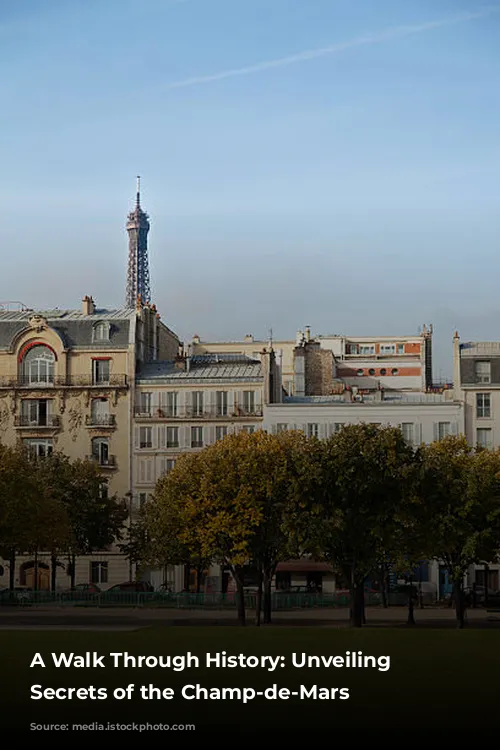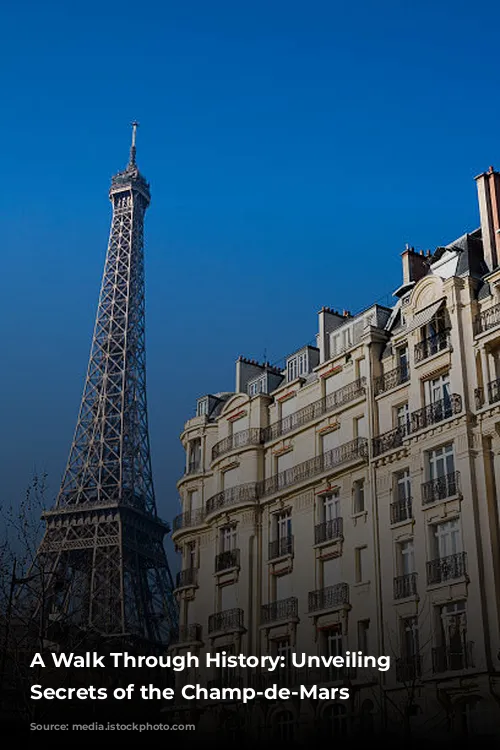The Champ-de-Mars: a name synonymous with Parisian charm and grandeur, conjuring images of leisurely strolls, picnics under the Eiffel Tower, and the dazzling spectacle of New Year’s fireworks. But this peaceful haven has witnessed a rich and turbulent history, one that stretches back centuries.

From Roman Mythology to Military Might: Tracing the Origins of a Name
The name “Champ-de-Mars” isn’t unique to the Parisian landscape. It’s rooted in Roman mythology, originally referring to spaces dedicated to military parades and training exercises. Garrison towns across the Roman Empire, including Paris, had their own Champ-de-Mars, named in honor of Mars, the god of war.
Even today, some towns still boast their own Champ-de-Mars, a testament to their military heritage. The Parisian Champ-de-Mars, in particular, reflects the military history that has profoundly shaped France.

A Shifting Landscape: From Vineyards to Military Manoeuvres
The Parisian Champ-de-Mars, however, has undergone a dramatic transformation, evolving from a vast expanse of vineyards and gardens in the 16th century to a prime military training ground in the 18th century. This shift in purpose gave the place its name, as it became a strategically important site for military maneuvers. The scale of these exercises was impressive, with over 10,000 soldiers participating in battle formations, all contained within the enormous space, protected by wrought-iron gates.

A Stage for History: Revolution, Races, and Universal Expositions
The French Revolution ushered in a new era for the Champ-de-Mars, transforming it into a focal point for significant historical events. It became the site for celebrating the storming of the Bastille on July 14th, a tradition that continues to this day.
The Belle Époque witnessed the Champ-de-Mars become a thriving hub for horse racing, attracting massive crowds and solidifying its connection to this equestrian tradition. The legendary horse, Jappeloup, even celebrated his 25th anniversary here in 1991, drawing top riders from around the world for a spectacular show jumping event.
The Champ-de-Mars also served as the grand stage for Universal Expositions in the 19th century, events that drew visitors from across the globe. It was during the 1889 Exposition that the Eiffel Tower rose majestically over the landscape, and the army ceded the Champ-de-Mars to the City of Paris, paving the way for its transformation into the expansive green park we know today.

A Timeless Oasis: A Place to Gather, Celebrate, and Simply Be
The Champ-de-Mars continues to hold a special place in the hearts of Parisians and visitors alike. It’s a hub for celebrating significant milestones, like the triumph of the French football team in 1998 and 2018. But beyond these grand celebrations, the Champ-de-Mars offers a serene refuge where people can stroll, relax, and enjoy the beauty of the city.

A Green Jewel in the City: A Sanctuary of Nature and History
Today, the Champ-de-Mars stands as one of the largest green spaces in Paris, spanning a sprawling 24.5 hectares. It’s the only public garden in the city that remains open 24 hours a day, offering a breathtaking panorama of the Eiffel Tower and the École Militaire.
Inspired by both French and English gardens, the Champ-de-Mars is a tapestry of sprawling lawns, winding paths, and majestic bronze statues. It’s a UNESCO World Heritage Site, boasting rare trees that attract a diverse range of bird species you’d usually find in remote forests. Even the legendary tawny owl of the Champ-de-Mars calls this park home, its hoots echoing through the night.

A Future of Festivities: The Champ-de-Mars Ready to Shine Again
The Champ-de-Mars, open and accessible to all, continues to be a vibrant center for events, hosting concerts, political gatherings, and sporting events. 2024 will mark a new chapter for this historic park, as it becomes the venue for numerous events during the Paris Games, thanks to the Eiffel Tower stadium and Champ-de-Mars Arena.
The Champ-de-Mars has always been a place where Parisians and visitors come together. In 2024, it will once again unite people in celebration, as it hosts the Olympic Games, echoing the spirit of unity and grandeur that has always defined this iconic space.








